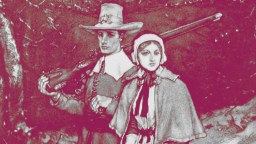All Videos
All Stories
Abbott listens to music to get on the right frequency.
▸
1 min
—
with
Abbott talks about how she could write about such dark materials.
▸
2 min
—
with
We have a vicarious need to see how far we could go, Abbott says.
▸
1 min
—
with
It would depend, Abbott says, on their class background.
▸
1 min
—
with
At this point, urbanization was starting to change the social dynamic of courtship, says Abbott.
▸
3 min
—
with
Legalization would make an unavoidable practice safer.
▸
1 min
—
with
Abbott describes the turn-of-the-century culture that created the conditions for white slavery.
▸
2 min
—
with
Chicago is still the most theatrically corrupt city, Abbott says.
▸
1 min
—
with
What motivated the social and political reformers in early 20th-century Chicago?
▸
2 min
—
with
Abbott’s book started with a lost great-great aunt, and ended with an exploration of the Everleigh sisters and the politics of sex in turn-of-the-century Chicago.
▸
9 min
—
with
Abbott was always drawn to people’s darker impulses.
▸
2 min
—
with
A Catholic school graduate writing about strippers and prostitutes. The nuns, Abbott says, would be proud.
▸
2 min
—
with
Voters should focus on the issues, Fuller says.
▸
1 min
—
with
Readers don’t turn to “Star” for political coverage, Fuller says
▸
1 min
—
with
Bonnie Fuller on surviving in a hostile work environment.
▸
3 min
—
with
Cut yourself some slack, Fuller says.
▸
2 min
—
with
Nothing but praise.
▸
1 min
—
with
“Star,” Fuller says, gives readers a more complete picture than a blog.
▸
1 min
—
with
Celebrities come in all different shapes and sizes.
▸
3 min
—
with
Fuller does not condone long-range pictures.
▸
1 min
—
with
The relationship is completely symbiotic, Fuller says.
▸
3 min
—
with
Gossip is a social glue, Fuller says.
▸
3 min
—
with
Fuller talks about turning “Star” Magazine around.
▸
3 min
—
with
Two generations does not a dynasty make.
▸
2 min
—
with
Adams was willing to suffer anything for a truly revolutionary ideal, McCullough says.
▸
3 min
—
with





























